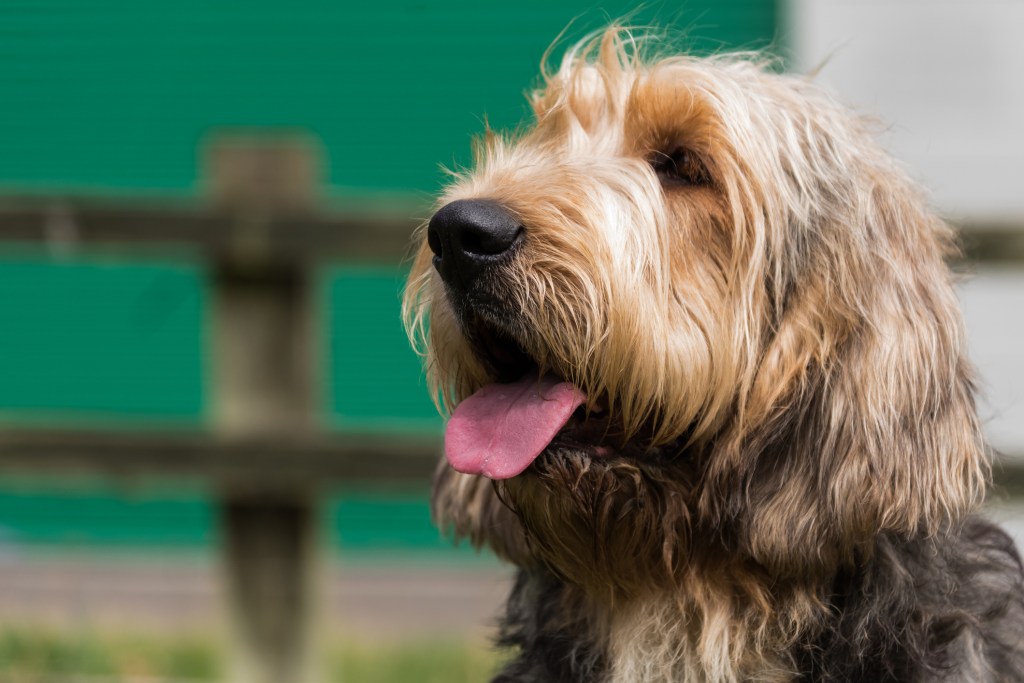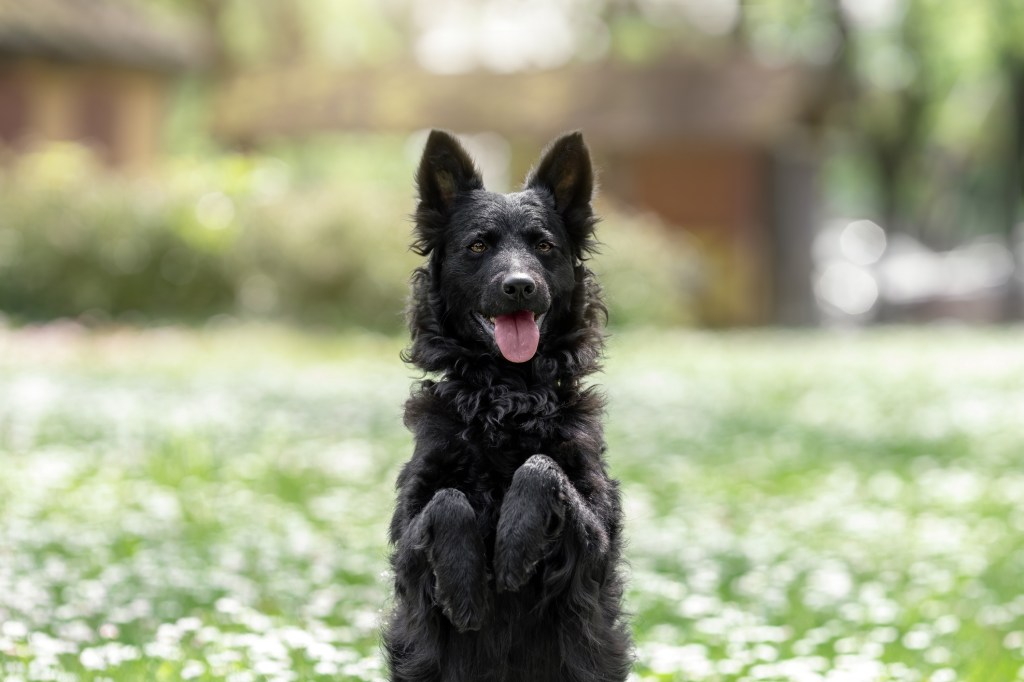While some of the world’s most popular dogs include favorites like the Labrador Retriever, French Bulldog, and German Shepherd, there are a number of breeds considered vulnerable. Sadly, some are even at a high risk for extinction. Without the work of preservationists, a number of our most beloved dog breeds may have disappeared many years ago. Here are ten of the most vulnerable dog breeds facing extinction.
Scottish Deerhound

The Scottish Deerhound, similar in appearance to the Irish Wolfhound, originated from the misty hills of Scotland. Known for their skilled deer hunting, they served as a noble companions to Scottish chieftains. With a tall, slender frame, shaggy coat, and gentle temperament, Scottish Deerhounds played a vital role in Scottish history. During the 18th and 19th centuries, the breed faced a perilous decline as political conflicts and uprisings transformed the culture of the Scottish Highlands. By the late 19th century, they were at risk of disappearing entirely. Dedicated enthusiasts worked tirelessly to revive the breed through careful breeding and preservation initiatives. However, these majestic dogs remain rare to this day.
Otterhound

The Otterhound, officially rarer than the white rhino with fewer than 1,000 worldwide, is the United Kingdom’s most endangered native dog breed. Believed to have originated in the Scottish Borders during the medieval period, they were initially bred to protect the fishing industry from otters. After the United Kingdom’s ban on otter hunting in 2002, the Otterhound faced near disappearance. The breed is now considered vulnerable. Recognized for its sensitive and calm disposition, the Otterhound makes a delightful companion for adventurous pet owners. It’s important to note that the Otterhound may not be suitable for everyone due to its messy eating habits and love for playing in muddy conditions.
Skye Terrier

The Skye Terrier, combining the compact stature of a Terrier with the shaggy coat reminiscent of an Old English Sheepdog, was initially bred as a skilled pest exterminator. Later, they became favored companions among English and Scottish nobility. This charming breed has not only graced households but also become a part of British legends, with stories like Mary, Queen of Scots reputedly bringing one to her execution and the famed Skye named Greyfriars Bobby standing guard over his owner’s grave in Edinburgh for an impressive 14 years. Queen Victoria’s adoration further popularized a variety featuring pointed ears. In the contemporary era, as novel designer breeds gain prominence, Skye Terriers have somewhat receded into the background. Nevertheless, dedicated enthusiasts are fervently working towards a resurgence, determined to ensure that Skye Terriers regain the attention and appreciation they rightfully deserve.
Lagotto Romagnolo

The Lagotto Romagnolo, often mistaken for a Poodle Mix, is recognized as the world’s oldest water retriever. This charming dog originated in medieval times in the Italian region of Romagna. Initially a skilled duck retriever with a woolly, waterproof coat, muscular build, and a keen sense of smell, this rare breed played a crucial role in duck-hunting expeditions for centuries. Despite facing near extinction in the 1970s, dedicated Italian breeders revived the Lagotto Romagnolo, focusing on its exceptional qualities. Playful and easy to train, this resourceful retriever holds the unique honor of being the only officially recognized dog breed for truffle hunting. It’s probably worth mentioning that the Lagotto’s casual stroll could turn into an energetic race at a moment’s notice, with a keen interest in sniffing for treasures or romping through puddles.
Norwegian Lundehund

The Norwegian Lundehund, known for their distinctive six toes on each foot and remarkable flexibility, has a rich but tumultuous history. Bred to hunt puffins along steep cliffs in Norway, the Lundehund’s unique physical characteristics, including double-jointed necks and the ability to fold their ears shut, aided them in navigating treacherous spaces. Despite their historical significance, the breed faced near extinction in the mid-20th century. Changes in fishing practices reducing the demand for their specialized puffin-hunting skills. Efforts have been made to preserve the breed through careful breeding programs, but this unique breed remains highly endangered.
Mudi

The Mudi, a Hungarian-born breed pronounced as ‘moody,’ defies its name with a cheerful and active disposition. Highly vulnerable, there are only a few thousand of these dogs worldwide. Recognized by pointy ears and a wavy-haired coat, the Mudi naturally evolved in the 1800s through crosses between the well-known Pumi and Puli breeds. With a high intelligence and swift movements, Mudis commonly work as herding dogs. Overflowing with energy and intrinsic curiosity for exploration, they make ideal companions for those who relish an active lifestyle and the great outdoors. Despite their zest for adventure, these Hungarian sheepdogs love affectionate downtime.
Dandie Dimont Terrier

Dandies, among terrier breeds, are exceptionally rare, once serving as industrious working dogs and dedicated rodent hunters. Evolving over time, these irresistibly cuddly bundles of fur have shifted roles to become cherished family pets. They feature a charming appearance reminiscent of a cross between a Dachshund and a plush bathmat. Despite the global popularity enjoyed by terrier breeds like the Yorkie, Dandies faced a less fortunate fate due to challenges during the First and Second World Wars. Food rationing compelled breeders to halt mating, diminishing opportunities for Dandies to gain widespread recognition. As a result, there is a prevalent risk this unique dog breed could face extinction.
Tibetan Mastiff

The majestic Tibetan Mastiff, symbolizing ancient Tibetan culture with its imposing stature and luxurious coat, originates from the Himalayan mountains. Traditionally serving as guardians for livestock, monasteries, and nomadic camps, these formidable dogs exhibit impressive strength, intelligence, and independence. Despite this remarkable dog breed facing near extinction due to political and cultural upheavals in Tibet, as well as changes in nomadic lifestyles, dedicated efforts by enthusiasts worldwide have revived and preserved the Tibetan Mastiff. While remaining a rare breed, their regal presence and historical significance endure.
Glen of Imaal Terrier

For Terrier enthusiasts desiring a down-to-earth companion, the Glen of Imaal Terrier, originating from the remote Irish region that shares its name could be an ideal match. Affectionately known as “Glens,” these dogs evoke the image of sturdy farm dogs found in beloved children’s books. Like many Terrier breeds, Glens encountered challenges during wartime rationing. They are now classified as at-risk for potential extinction according to the UK Kennel Club.
Cardigan Welsh Corgi

The Cardigan Welsh Corgi, characterized by its distinctive long tail and foxy expression, is a small herding dog originating from Wales. Historically valued for their herding abilities, especially in driving cattle, these intelligent and affectionate dogs played a crucial role in rural life for Welsh farmers. The Cardigan Corgi faced a precarious period in the mid-20th century, nearing extinction due to declining numbers caused by changes in agricultural practices and modernized farming equipment. Although Cardigan Corgis bounced back from this tumultuous period, they are still considered a vulnerable breed in the UK.
Adopting a dog breed facing extinction
Adopting a rare dog breed facing extinction comes with the responsibility of becoming its ambassador as well as a loving pet-parent. Finding rescues dedicated to the preservation of these breeds may be difficult. Still, is worth the extra time to make a positive change the life of an already vulnerable breed. In being an ambassador for these rare breeds, dog owners play a vital role in education, awareness, and fostering appreciation for the distinct qualities and histories that make each breed extraordinary.









